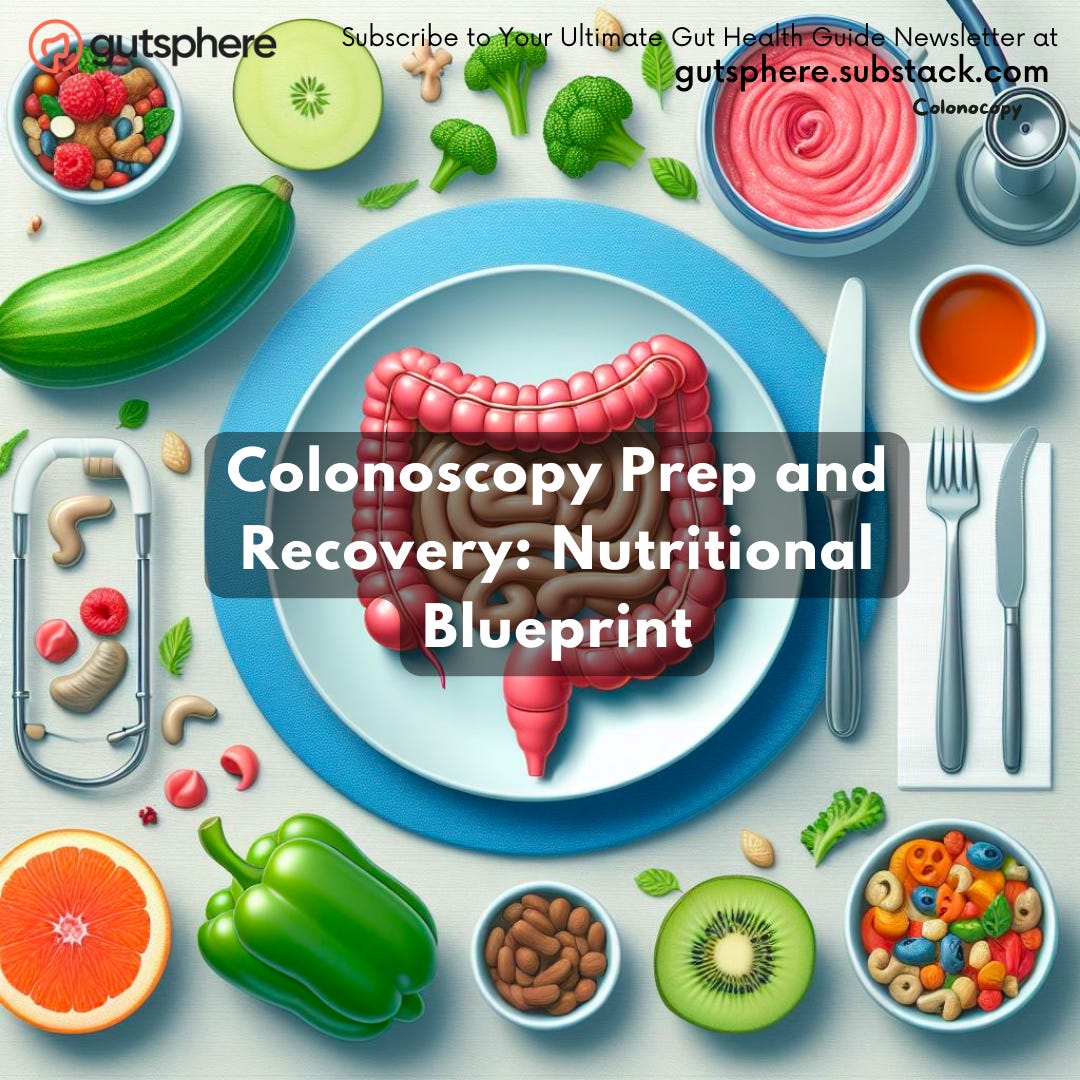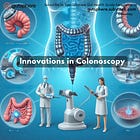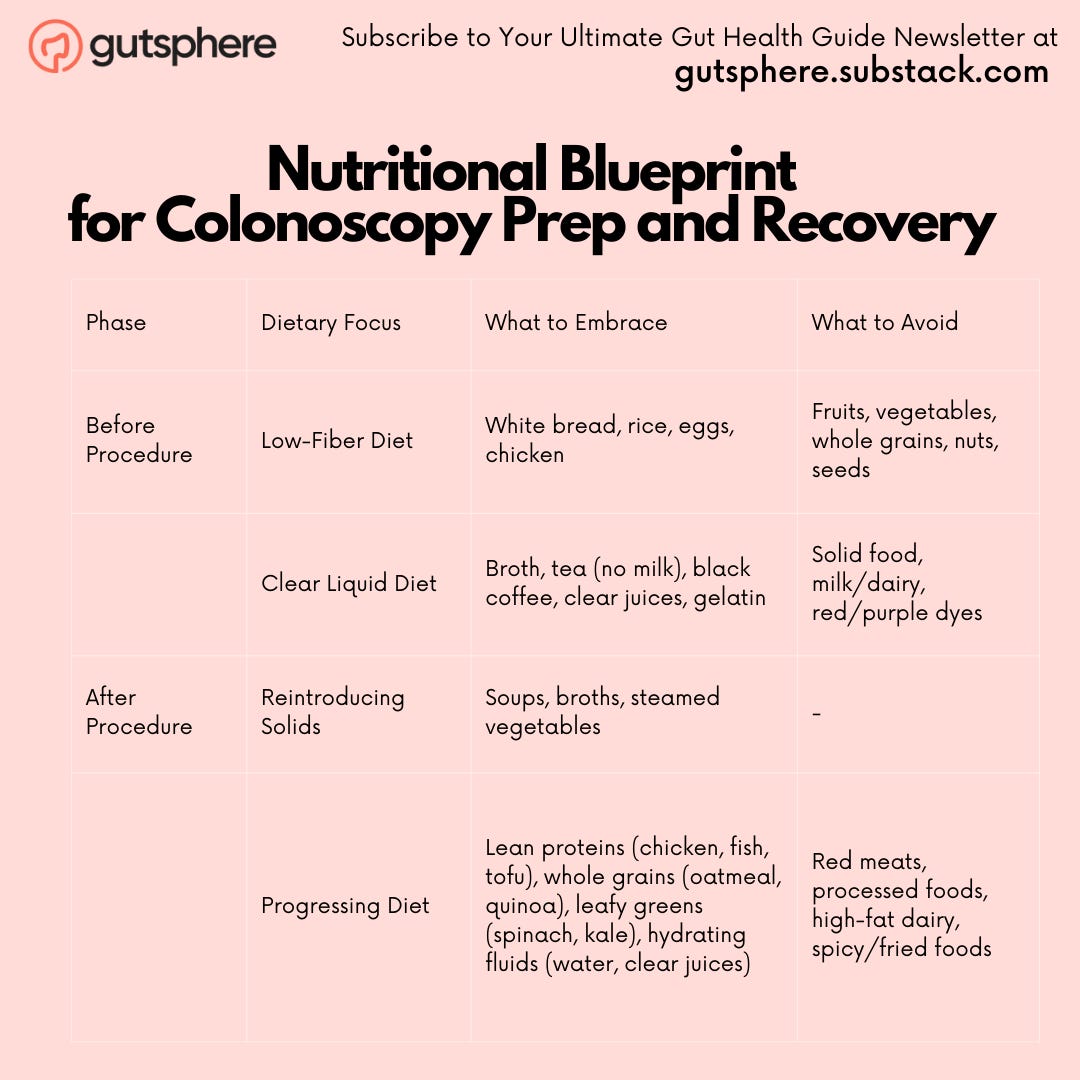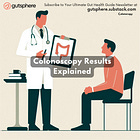Nutrition's Role in Colon Health and Colonoscopy Prep ( Part 6/10)
Offers nutritional advice for before and after the procedure, emphasizing foods that support a healthy colon.
PREVIOUS
Introduction: A Healthy Foundation for a Healthy Colon
Welcome back to our Gutsphere community. In this enlightening sixth edition, we delve into an often-overlooked cornerstone of gastrointestinal well-being: nutrition. With guidance from expert nutritionists, we explore the pivotal role diet plays not just in maintaining optimal colon health but also in preparing for a colonoscopy. Understanding how the foods we consume impact our colon and the effectiveness of colonoscopy prep is crucial. This edition is dedicated to shedding light on nutritional practices that support a healthy colon, offering valuable advice for your journey before and after the procedure.
Nourishing Your Way to a Healthier Colon
The Impact of Diet on Colon Health
A balanced diet is instrumental in promoting a healthy digestive system. Dietary choices can influence colon health significantly, affecting everything from bowel regularity to the risk of developing polyps or colorectal cancer.
Fiber-Rich Foods: The Cornerstone of Colon Health
Fiber stands out as a key nutrient for colon health, serving multiple roles in maintaining a healthy digestive system. It aids in:
Enhancing Digestive Efficiency: Fiber adds bulk to the stool, facilitating smoother transit through the colon. This not only helps keep the colon clear but also mitigates the risk of constipation, a common concern that can lead to more serious complications.
Reducing Polyp Formation: Regular consumption of fiber-rich foods is associated with a lowered risk of developing polyps, benign growths that can evolve into colorectal cancer if left unchecked.
Actionable Steps:
Incorporate a variety of fruits, vegetables, and whole grains into your diet.
Aim for at least 25-30 grams of fiber daily, gradually increasing intake to prevent digestive discomfort.
Probiotics and Prebiotics: Allies in Gut Health
The health of our gut microbiome, the complex community of microorganisms residing in our digestive tract, is intricately linked to our overall well-being. Probiotics (live beneficial bacteria) and prebiotics (fibers that feed these bacteria) are vital for:
Supporting Digestive Health: They enhance the digestion process and can alleviate symptoms of irritable bowel syndrome (IBS) and other digestive disorders.
Boosting Immune Function: A healthy gut microbiome plays a crucial role in the body's immune response, helping to ward off pathogens.
Actionable Steps:
Include probiotic-rich foods in your diet, such as yogurt, kefir, and fermented foods like sauerkraut and kimchi.
Consume prebiotic foods like bananas, onions, garlic, and asparagus to nourish beneficial gut bacteria.
Hydration: The Unsung Hero of Digestive Health
Adequate hydration is a simple yet effective strategy for supporting colon health. Water plays an indispensable role in:
Softening Stool: Ensuring sufficient water intake helps soften the stool, making bowel movements easier and preventing constipation.
Facilitating Nutrient Absorption: Water aids in the dissolution of soluble fiber, enhancing its beneficial effects in the digestive system.
Actionable Steps:
Drink at least 8 glasses of water daily, or more based on your activity level and climate.
Incorporate water-rich foods into your diet, such as cucumbers, melons, and celery, to boost your hydration.
Nutrition and Colonoscopy Prep: A Guide to Optimal Preparation and Recovery
Preparing for a colonoscopy is a critical process that demands attention to detail, especially when it comes to your diet. The foods you consume in the days leading up to and following your procedure can significantly impact both the effectiveness of the colonoscopy and your overall comfort. This chapter provides a comprehensive guide on how to navigate your diet during this crucial time, offering insights into the best foods to embrace and those to avoid for an optimal colonoscopy experience.
Before the Procedure: Dietary Preparation
The Importance of a Low-Fiber Diet
In the days leading up to your colonoscopy, transitioning to a low-fiber diet is crucial. High-fiber foods can linger in the colon, complicating the cleansing process necessary for a clear view during the procedure.
What to Eat: Opt for easily digestible foods that are gentle on your digestive system. Examples include white bread, rice, eggs, and chicken.
What to Avoid: Steer clear of fruits, vegetables, whole grains, nuts, and seeds as these are high in fiber and can obstruct the colonoscope's path.
Transitioning to a Clear Liquid Diet
Typically, one to two days before your colonoscopy, you'll be advised to adhere strictly to a clear liquid diet. This step is vital for ensuring your colon is as clean as possible.
Recommended Choices: Broth, tea (without milk), black coffee, clear juices (such as apple or white grape), and clear gelatin are excellent choices. Remember to hydrate well with water and electrolyte solutions to maintain hydration.
Foods and Drinks to Avoid: Any solid food, milk or dairy-based liquids, and anything colored red or purple as they can mimic blood in the colon.
After the Procedure: Navigating Recovery Through Diet
Gradual Reintroduction of Solid Foods
After your colonoscopy, it's important to gently reintroduce solid foods into your diet. Start with light, bland meals to avoid upsetting your digestive system, which might still be sensitive from the procedure.
Initial Foods: Begin with soups, broths, and steamed vegetables. These foods are easy on the digestive system and provide necessary nutrients for recovery.
Progressing Your Diet: Gradually incorporate more solid foods such as lean proteins and whole grains as your body adjusts post-procedure.
Foods to Embrace and Avoid for Optimal Recovery
Foods to Embrace:
Lean Proteins: Chicken, fish, and tofu can provide essential nutrients without straining your digestive system.
Whole Grains: As you begin to reintroduce fiber into your diet, opt for whole grains like oatmeal and quinoa in small quantities.
Leafy Greens: Introduce leafy greens such as spinach and kale gradually, as they are rich in vitamins and minerals but also high in fiber.
Hydrating Fluids: Continue to drink plenty of water, clear juices, and herbal teas to stay hydrated.
Foods to Avoid:
Red Meats and Processed Foods: These can be hard on your digestive system and may hinder recovery.
High-Fat Dairy Products: Foods like cheese and ice cream can be difficult to digest and should be reintroduced slowly.
Spicy and Fried Foods: Avoid these as they can irritate your digestive tract and cause discomfort.
Conclusion: Your Diet, Your Health
As we wrap up this edition, remember that the journey to a healthy colon is a journey of mindful eating. The foods you choose to eat play a crucial role not only in your overall health but also in the success of medical procedures like colonoscopies. By incorporating the nutritional advice shared here, you're taking an active step toward a healthier digestive system and a healthier you.
NEXT
What's Next: Unveiling the Mysteries of Your Results
Stay tuned for our next edition, where we'll guide you through Understanding Your Colonoscopy Results. This upcoming issue will demystify the findings of your colonoscopy, discuss common outcomes, potential follow-up actions, and underscore the importance of regular screenings in colorectal health management. Join us as we continue to navigate the path of understanding and action in our quest for optimal health.
Until then, eat well, live well, and stay tuned for more insights into your health and well-being.
Warm regards,
Your Gutsphere Team
Request
Share
Our sincere request to you is to share the newsletter with your friends, family, and community so that they can benefit from the content. Also it will help us grow the newsletter, and eventually, as we release more content, digital tools, and more we will enable people around the world to live chronic disease free.
Subscribe
Feedback
Also, please give us feedback so that we can improve the content. And if there are any topics that you want us to cover please send us your questions and topics. Furthermore, if you try any of the things we provided information please share your experience with us.
Disclaimer
Please note that the information provided in this newsletter is for informational purposes only and should not be considered as a substitute for professional medical advice, diagnosis, or treatment. If you have any concerns or questions about our health, please consult with a licensed healthcare professional. The information contained in this newsletter is not intended to diagnose, treat, cure, or prevent any disease. The publisher and authors of this newsletter assume no responsibility for any adverse effects that may result from the use of the information contained herein.





